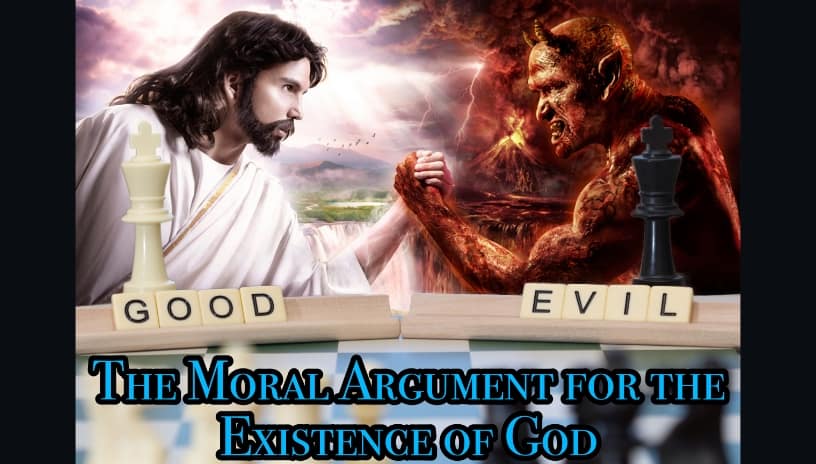Introduction
According to recent sociological studies, approximately 30 percent of non-Christian teens reject the faith because of the problem of evil,1 and atheists often leverage evil as a contention against the reality of God. Ironically, the existence of evil provides a strong argument for the existence of God, as the theistic worldview seems to provide the only rational foundation for the existence of moral values and duties.2 Accordingly, this paper will examine the moral argument for the existence of God, highlighting the superior explanatory power and scope of Christian theism over naturalistic alternatives.
Formulating the Argument
Although Christian apologists actively debate whether to employ abductive or deductive reasoning in formulating a moral argument,3 both intend to establish the explanatory superiority of theism over atheism, while the deductive variation seeks to establish God as an inescapable facet of reality. Since abduction is necessary for establishing the second premise of the deductive variant, and it appears to inevitably lead to a contention of the first premise,4 this examination will leverage deductive argument as formulated by notable philosopher William Lane Craig, who contends:5
1. If God does not exist, objective moral values [and duties] do not exist.
2. Objective moral values [and duties] do exist.
3. Therefore, God exists.
The subsequent sections of this essay will examine each of the propositions while establishing them as more plausible than their denial.6
Defending Objective Morality
The Case Against Moral Relativism
Postmodern presuppositions often obscure the objective nature of virtue, and it seems Americans are increasingly accepting a relativistic framework of truth, religion, and morality.7 However, the very notion of relativism is self-refuting, as it repudiates the existence of absolutes, while simultaneously asserting itself as an absolute facet of reality. Underscoring the irrationality of relativistic contentions, Aristotle comments, “For the person that says that all things are true renders the statement contrary to this true also: wherefore, he makes his own affirmation not true; for the contrary says that it is not true; but he that says that all things are false, even himself falsifies his own position” (Metaphysics, IV.8, 1012b).
Applying the philosophy to morality, proponents demonstrate relativism’s pragmatic failures and fundamentally falsify their position through 1) the moral principles they advocate and 2) their personal responses to injustice. First, the moral relativist often champions tolerance, propagating the philosophy under the guise of inclusivity and cultural equality; yet, none of these values represent an objective standard under a relativistic model. While the relativist may subjectively cherish tolerance, inclusivity, and equality, there remains no basis for asserting such values are superior to intolerance, exclusivity, and inequality. Besides championing specific moral values over others, the relativist implicitly appeals to objective obligations in constructing a relative moral framework.
Explicating the relativist’s position, Gilbert Harman writes, “My thesis is that morality arises when a group of people reach an implicit agreement or come to a tacit under-standing about their relations with one another.”8 Incongruously, Harman’s thesis implies the existence of objective moral values and imperatives, as people are presumably bound to these agreements. Remaining consistent with the relativistic model, there is no reason someone must, should, or ought to remain faithful to such agreements, nor is there an objective obligation for citizens to respect the authority of governing officials or abide by their arbitrary legislation. Emphasizing the incongruity of the relativist’s position, C. S. Lewis writes,
A moment after they have admitted that good and evil are illusions, you will find them exhorting us to work for posterity, to educate, revolutionise, liquidate, live and die for the good of the human race. Do they remember while they are writing thus that when they tell us we ‘ought to make a better world’ the words ‘ought’ and ‘better’ must, on their own showing, refer to an irrationally conditioned impulse which cannot be true or false any more than a vomit or a yawn?9
Second, the relativist actively appeals to an objective standard when witnessing an atrocity or experiencing victimization themselves. Brilliantly responding to challenges of relativism, Lewis writes, “Whenever you find a man who says he does not believe in a real Right and Wrong, you will find the same man going back on this a moment later. He may break his promise to you, but if you try breaking one to him, he will be complaining ‘It’s not fair’ before you can say, ‘Jack Robinson.’”10 It seems people have intrinsic worth and dignity, and even when we devalue others, we fundamentally retain and actively defend our own. Moreover, the relativist often admonishes the persistence of evil in the world, while simultaneously denying the existence of absolute moral values. Consequently, the moral relativist constantly nullifies his position, actively acknowledging the existence of objective morality in his moral advocation and responses to victimization.
The Positive Case for Objective Moral Values and Duties
Besides refuting the notion of relativism, philosophers offer strong, a posterior, positive arguments for the existence of objective moral values and duties.11 Such arguments find basis in our moral intuition and ordinary experience in reality. Inherently, we recognize and detest genuinely evil things such as genocide, rape, and child molestation, while appreciating the virtue of self-sacrifice, love, and justice. Furthermore, it is inconceivable to postulate a circumstance in which a morally reprehensible action (e.g., torturing innocents for amusement) would be considered admirable—on the same level as philanthropy—or in which a righteous action would be considered immoral.
Similarly, we recognize obligations to treat others with dignity and respect, favor intellectual integrity, and pursue justice, while simultaneously experiencing a sense of guilt for our moral inadequacies. In this sense, the objectivity of moral values and duties represent a properly basic belief (i.e., moral realism is a self-evident facet of reality). Elucidating this principle, Paul Copan comments,
We should reasonably believe what is apparent or obvious to us unless there are overriding reasons to dismiss it (the credulity principle) a belief that applies to our sense perception, our reasoning faculty, and our moral intuitions/perceptions. In general, we take for granted the innocence of these capacities until they are proven guilty. We should accept their testimony unless we have strong reasons to doubt them.12
Accordingly, our conscience provides a solid reason for thinking objective moral values and duties exist, as our moral perception informs us of objective moral realities in the same way our visual and tactical senses inform us of our physical environment.13
Moreover, our everyday interactions inherently contain a moral component—one which only makes sense if objective moral values and duties exist. Expounding upon this notion in Mere Christianity, C. S. Lewis contends,
There must be a universal moral law, or else: (a) Moral disagreements would make no sense, as we all assume they do. (b) All moral criticisms [or judgments] would be meaningless (e.g., “The Nazis were wrong.”). (c) It is unnecessary to keep promises or treaties, as we all assume that it is. (d) We would not make excuses for breaking the moral law, as we all do.14
Deriving a case from the moral facts of reality, which are familiar to every person regardless of ethnic, cultural, or religious background, Lewis insists that moral disagreement, criticisms, and progress become meaningless if moral values are arbitrary. Unless there is a fact of the matter, debate is purposeless. One person’s preference for chocolate ice cream over vanilla remains inconsequential, but the same cannot be said about a person’s predilection toward pedophilia. Now, the skeptic might object, “The latter example involves someone else (i.e., a victim). If the pedophiliac were not hurting someone else, no one would care.” However, the very notion of victimization accentuates the objective nature of morality.
Underscoring the point further, philosopher Andrew Fisher explains,
Imagine that I claim that late-term abortion is morally wrong, but you claim it is not. Common sense [and the law of non-contradiction] tells us that we cannot both be right, and that one of us must have made a mistake. If moral realism is false and late-term abortions do not have either the property of being right or the property of being wrong, then it is hard to see why we cannot accept that we both could be right. In other words, we might think that moral realism is the best explanation for why we hold that an act cannot be both right and not-right, both good and not-good, and so on.15
Without an objective criterion, all actions and values remain morally neutral, rendering all moral debate, judgment, and critique inconsequential. Not only is such a proposition pragmatically untenable, but it also violates our properly basic beliefs concerning moral realities, and runs contrary to our ordinary interpersonal interactions.
Likewise, without an objective standard, moral progress is devoid of meaning. While someone may not prefer racial inequality, others might favor it. Without recognizing the inherent worth and dignity of human persons, why should a society move toward racial equality? Moreover, what does progress even mean in such a system? Progress toward what? Without an objective standard of goodness or rightness, there is nothing to advance toward, nor anything to digress from. Things are the way they are; nothing more and nothing less. There is no basis for moral improvement. However, we often witness the moral progression of people and societies, as hardened criminals become upstanding citizens and nations take active measures to abolish slavery and racial inequality. Such considerations lead Lewis to conclude, “It seems, then, we are forced to believe in a real Right and Wrong. People may be sometimes mistaken about them, just as people sometimes get their sums wrong; but they are not a matter of mere taste and opinion any more than the multiplication table.”16
Accordingly, while people may disagree about complex ethical issues (i.e., the practical application of moral principles in the context of a particular situation), there appears to be an objective moral framework, which is constantly reinforced by our intuition and moral experience in reality, and without which, moral disagreement, judgments, and progress become nonsensical.17 Considering the various facets of our moral experience, it seems perfectly reasonable to acknowledge the existence of objective moral values and duties, and the proposition appears much more plausible than its denial. In fact, propositions to the antithesis appear much less evident than the existence of moral realism itself.
Theism Best Explains Moral Realism
Establishing moral realism (premise two of the moral argument) is only half the battle, as the first premise entails demonstrating that objective morality necessitates the existence of a divine being. However, this premise appears evident, as the very notion of an objective moral law seems to imply the existence of a transcendent moral Lawgiver. Affirming the existence of objective moral values is to maintain specific values (or moral properties) exist regardless of personal belief. Under theism, God’s immutable nature provides the locus of moral value, providing the absolute source for judging the behavior of moral agents. Thus, if God exists, then objective moral values exist. Conversely, if God does not exist, there does not appear to be an ontological ground for the moral aspect of reality, as atheistic alternatives result in a purely subjective moral framework—values that are arbitrary products of social convention or survival mechanisms arising from inadvertent evolutionary processes. Fittingly, William Lane Craig comments,
If there is no God, then any basis for regarding the herd morality evolved by Homo sapiens as objectively true seems to have been removed. Some action—say, rape—may not be biologically or socially advantageous and so in the course of human evolution has become taboo; but on the atheistic view there’s nothing really wrong about raping someone. Such behavior goes on all the time in the animal kingdom. . . . There can be standards that are relative to human needs and desires, but they are then not unconditional, objective, categorical moral principles or standards.18
Similarly, the existence of moral imperatives seems to require an explanation as well. Under the theistic model, God’s moral character finds expression in the telos of His creation and through the issuance of divine commands, thus providing the basis of moral duties. In contrast, the atheistic worldview provides no foundation for moral requirements. While an individual may feel a sense of duty and experience a feeling of guilt in the wake of a moral failing, such mental states are purely the result of inconsequential chemical reactions in the brain and are not representative of an actual obligation or immoral behavior. Aptly, philosopher Richard Taylor concludes, “The concept of moral obligation [is] unintelligible apart from the idea of God. The words remain, but their meaning is gone.”19
Furthermore, the very concept of an obligation appears to require a component of accountability, without which, moral obligations become irrelevant.20 Appropriately, theism provides a means of moral accountability, as a morally perfect (i.e., holy) being (God) presides as judge over moral agents, whose actions have eternal consequences. Inversely, atheism provides no reason for people to subject themselves to moral constraints, even if such responsibilities were to exist in an atheistic universe. Expressing this observation, William Lane Craig comments, “If life ends at the grave, it makes no difference whether one lives as a Stalin or as a saint. . . . Given the finality of death [in the atheistic worldview], it really does not matter how you live.”21
Therefore, it seems theism proves superior in explanatory power and scope, accounting for the moral aspects of reality while simultaneously providing an ontological basis for objective moral values and duties, and a means of personal accountability. As a result, it seems God’s existence is necessary for establishing an ontological foundation for objective morality, thus securing the first premise of the moral argument.
Responding to Objections
Recognizing the explanatory impotence, and often incoherence, of the relativist’s position, many atheists affirm moral realism (premise two) while rejecting God as a necessary foundation for the existence of objective moral values and duties (premise one).22 For example, philosopher Louise Antony rejects the notion of accountability being a necessary component of an objective moral law, thereby removing the requirement for a transcendent Lawgiver.23 Rationalizing her objection, professor Antony writes, “The suggestion that there would be no moral value unless virtue was certain to be rewarded and vice punished is tantamount to a reduction of moral value to prudential value. . . . Moral difference ought to count as something significant to anyone who believes in morality.”24
Regrettably, Antony’s objection contains an equivocation, misrepresenting the theist’s position by substituting values for obligations. Although moral values provide the underpinnings of obligations, each represents a separate facet of the moral landscape. The theist’s contention that without accountability, moral obligations are meaningless, seems to hold by definition; for what is an obligation (duty or responsibility) without accountability? Harmoniously, William Lane Craig comments, “Let’s suppose for the sake of argument that moral values do exist independently of God. Suppose that values such as mercy, justice, love, forbearance, and the like just exist. How does that result in any moral obligations for me? Why would I have a moral duty, say, to be merciful?”25 While moral values might exist without accountability, it seems moral responsibility requires moral agency and accountability to remain valid and binding.26
Additionally, professor Antony protests,
[In social legislation] it is not the system of sanctions that makes a law morally binding, but rather the recognition of the lawmaker’s right to make the law. . . . Even if God were the source of the particular rules we regard as moral imperatives, it would have to be his antecedent moral authority, not his powers of enforcement, that makes the rules morally binding.27
Again, her objection seems to miss the fundamental point of the argument. If God does not exist, what would represent a legitimate authority and origin of objective moral duties? However, if God does exist, His immutable nature provides the objective standard of morality, which necessarily flows into His actions and commands. As the morally perfect creator of the universe, God represents the ultimate moral authority, while simultaneously maintaining the powers of enforcement necessary for human accountability. Conversely, atheism does not explain the metaphysical ontology of objective moral values or responsibilities, and even if such values were to arise in such a system, there seems to be no reason to think moral duties would exist without a legitimate authority to issue such directives, while concurrently maintaining a system of accountability. While one may cite subjective, psychological reasons for feeling a sense of obligation, there is nothing objective to ground the existence of such responsibilities.
Nevertheless, it appears professor Antony correctly introduces the component of authority, as objective moral responsibilities seem to require both a legitimate issuing authority and a means of accountability to remain valid and binding. Theism provides such a metaphysical foundation, whereas atheism remains explanatorily impotent, failing to account for the existence of the moral values and obligations we experience on a daily basis. For these reasons, it seems the first premise remains more plausible than its denial.
Conclusion
Though atheists often appeal to the existence of evil as a contention against Christian theism, it seems the very existence of objective evil underscores the explanatory power and scope of the Christian worldview, as the existence of God seems to provide the only rational foundation for the existence of objective moral values and duties. Nevertheless, atheists readily challenge both premises of the moral argument for the existence of God by either advocating moral relativism or challenging God’s necessity in establishing moral realism. Regrettably, both approaches fail, as relativism proves pragmatically untenable while removing God from the equation ultimately eliminates any viable basis for affirming the existence of objective moral values and responsibilities. Consequently, the moral argument remains sound, and the very existence of objective morality provides a powerful reason for maintaining Christian theism.
- Barna Group and Impact 360 Institute, Gen Z: The Culture, Beliefs, and Motivations Shaping the Next Generation (Ventura, CA: Barna, 2018), 62, PDF e-book.
- If objective moral values and duties do not exist, then evil does not exist either—at least in any objective sense.
- David Baggett, and Jerry L. Walls, God & Cosmos: Moral Truth and Human Meaning (New York, NY: Oxford, 2016), 54-78.
- Ibid., 70; 75.
- William Lane Craig, “Why I Believe God Exists,” in Why I Am a Christian: Leading Thinkers Explain Why They Believe, ed. Norman L. Geisler (Grand Rapids, MI: Baker, 2001), 75.
- This examination begins by presenting a defense of the second premise, for if objective moral values and duties do not exist, there is no point in contending theism provides the necessary foundation for moral realism.
- Barna Group and Impact 360 Institute, Gen Z, 55-59; 64; 80; 103-104; Barna Group, "The End of Absolutes: America’s New Moral Code," Barna Group, May 25, 2016, https://www.barna.com/research/the-end-of-absolutes-americas-new-moral-code/.
- Gilbert Harman, “Moral Relativism Defended,” The Philosophical Review 84, no. 1 (1975): 3.
- C. S. Lewis, Miracles: A Preliminary Study (1947; repr., New York, NY: HarperOne, 2001), 57.
- C. S. Lewis, Mere Christianity (1952; repr., New York, NY: HarperOne, 2001), 6.
- Cf. Terence Cuneo, The Normative Web: An Argument for Moral Realism (New York, NY: Oxford, 2007); Robert Audi, Moral Perception (Princeton, NJ: Princeton, 2013); Baggett and Walls, God & Cosmos, 146-178.
- Paul Copan, “The Moral Argument,” in Christian Apologetics: An Anthology of Primary Sources, ed. Khaldoun A. Sweis and Chad V. Meister (Grand Rapids, MI: Zondervan, 2012), 176.
- Cf. Richard N. Boyd, “How to Be a Moral Realist,” in Essays on Moral Realism, ed. Alfred Jules Ayer (Ithaca, NY: Cornell, 1988), 184-185; David O. Brink, “The Autonomy of Ethics,” in The Cambridge Companion to Atheism, ed. Michael Martin (New York, NY: Cambridge, 2007), 149.
- This summary of Lewis’ first premise appears in Norman L. Geisler, “Moral Argument for God,” Baker Encyclopedia of Christian Apologetics (Grand Rapids, MI: Baker Books, 1999), 500.
- Andrew Fisher, Metaethics: An Introduction (New York, NY: Routledge, 2014), 58-59.
- Lewis, Mere Christianity, 7.
- Lewis details moral principles which appear to transcend culture in C. S. Lewis, The Abolition of Man or Reflections on Education with Special Reference to the Teaching of English in the Upper Forms of Schools (1944; repr., New York, NY: HarperOne, 2001), 83-101.
- Quoted in Robert K. Garcia, and Nathan L. King, eds., Is Goodness without God Good Enough? A Debate on Faith, Secularism, and Ethics (Lanham, MD: Rowman & Littlefield, 2009), 32; 36.
- Richard Taylor, Ethics, Faith, and Reason (Englewood Cliffs, NJ: Prentice-Hall, 1985), 84.
- This concept becomes explicit when ruminating upon the nature of moral obligations, cf. C. Stephen Evans, God & Moral Obligation (New York, NY: Oxford, 2014), 2-4; especially concerning moral prohibitions, cf. Scott M. James, An Introduction to Evolutionary Ethics (Malden, MA: Wiley-Blackwell, 2011), 56.
- Quoted in Garcia and King, Is Goodness without God Good Enough?, 33.
- Acceptance of the second premise is an inherent aspect of any objection from evil. Accordingly, to achieve success in debunking the argument, the opponent must demonstrate the first premise is logically incoherent or provide a more plausible explanation for moral ontology. Additional examples of naturalistic attempts to explain the existence of objective moral duties are found in C. Stephen Evans, Natural Signs and Knowledge of God: A New Look at Theistic Arguments (New York, NY: Oxford, 2010), 116-131.
- Louise Antony, “The Failure of Moral Arguments,” in Debating Christian Theism, ed. J. P. Moreland, et al. (New York, NY: Oxford, 2013), 108-110.
- Ibid., 108-109.
- Craig, “Why I Believe God Exists,” 76.
- Moral agency entails people possess 1) self-consciousness, 2) free will, and 3) the capacity to reason and make moral judgments.
- Antony, “The Failure of Moral Arguments,” 110.




